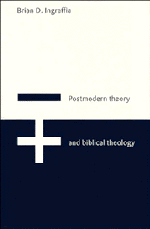Book contents
- Frontmatter
- Contents
- Acknowledgements
- List of abbreviations
- Note on translations of the Bible
- Introduction: postmodernism, ontotheology, and Christianity
- 1 NIETZSCHE'S MOCKERY: THE REJECTION OF TRANSCENDENCE
- II HEIDEGGER'S FORGETTING: THE SECULARIZATION OF BIBLICAL ANTHROPOLOGY
- 6 From the death of God to the forgetting of Being
- 7 Heidegger's theological origins: from biblical theology no to fundamental ontology
- 8 The redemptive–eschatological separation of flesh and Spirit in the epistles of the Apostle Paul
- 9 Inauthenticity and the flesh
- 10 The eigentlich Selbst or the pneumatikos anthropos
- III DERRIDA'S DENIALS: THE DECONSTRUCTION OF ONTOTHEOLOGY
- Conclusion: ontotheology, negative theology, and the theology of the cross
- Notes
- Bibliography
- Index
9 - Inauthenticity and the flesh
Published online by Cambridge University Press: 01 June 2011
- Frontmatter
- Contents
- Acknowledgements
- List of abbreviations
- Note on translations of the Bible
- Introduction: postmodernism, ontotheology, and Christianity
- 1 NIETZSCHE'S MOCKERY: THE REJECTION OF TRANSCENDENCE
- II HEIDEGGER'S FORGETTING: THE SECULARIZATION OF BIBLICAL ANTHROPOLOGY
- 6 From the death of God to the forgetting of Being
- 7 Heidegger's theological origins: from biblical theology no to fundamental ontology
- 8 The redemptive–eschatological separation of flesh and Spirit in the epistles of the Apostle Paul
- 9 Inauthenticity and the flesh
- 10 The eigentlich Selbst or the pneumatikos anthropos
- III DERRIDA'S DENIALS: THE DECONSTRUCTION OF ONTOTHEOLOGY
- Conclusion: ontotheology, negative theology, and the theology of the cross
- Notes
- Bibliography
- Index
Summary
As it is, it is no longer I myself who do it, but it is sin living in me.
Paul, Romans 7:17Proximally, it is not “I,” in the sense of my own Self, that “am,” but rather the Others, whose way is that of the “they.”
Heidegger, Being and TimeTheologians such as Bultmann, Tillich, and Macquarrie have been the quickest to recognize the affinities between the Heideggerian analysis of Dasein and the Pauline description of anthropos, but instead of demonstrating how Heidegger borrowed extensively from the New Testament, they have used Heidegger's analysis of Dasein to formulate a new existentialist Christian theology.
Bultmann, in defense of his use of Heidegger's existential analysis in his New Testament theology, seems to understand that Heidegger is borrowing directly from the New Testament: “Above all, Heidegger's existentialist analysis of the ontological structure of being [Dasein] would seem to be no more than a secularized, philosophical version of the New Testament.” More often, however, Bultmann fully accepts Heidegger's claim that his ontological description of Dasein must precede any “ontic” claims made by theology about the nature of man in order for these claims to be conceptually understood.
But surely this is a reversal of the proper way to assess the relationship. Heidegger read and studied the Bible and Christian theology before he wrote Being and Time. Hans Jonas formulates the relationship correctly in his essay “Heidegger and Theology”:
But does the consonance on the philosopher's part arise from independent philosophical reflection, or was the Biblical model itself a factor in the reflection? […]
- Type
- Chapter
- Information
- Postmodern Theory and Biblical TheologyVanquishing God's Shadow, pp. 138 - 150Publisher: Cambridge University PressPrint publication year: 1995



